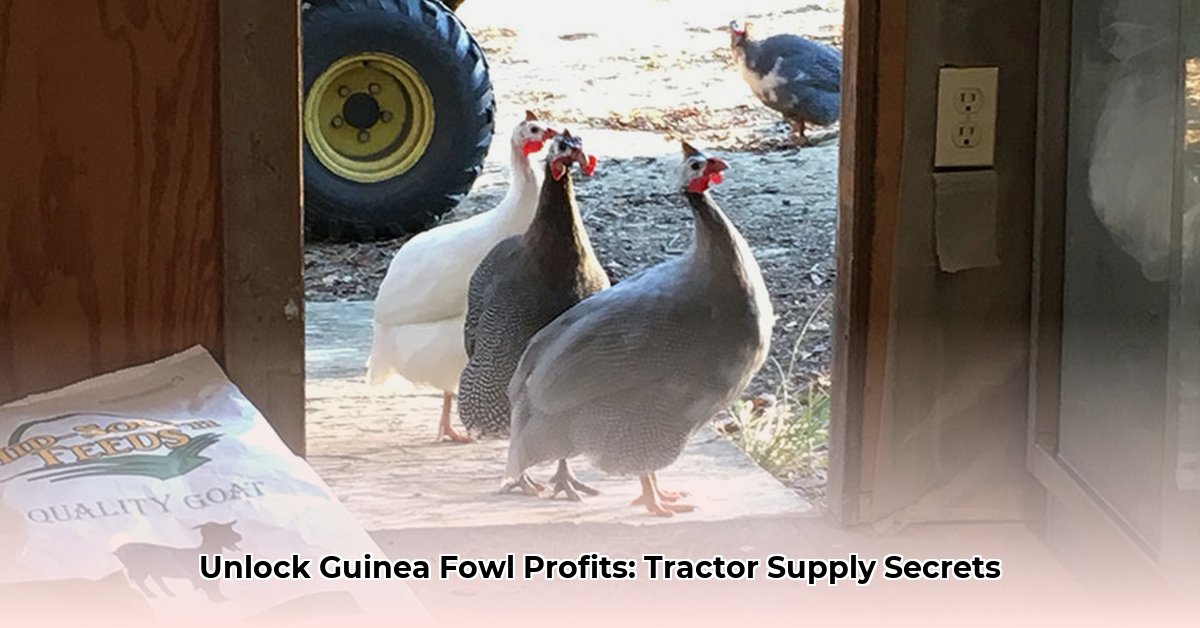
Guinea Fowl Farming: A Path to Profitable Poultry with Tractor Supply
Raising guinea fowl presents a unique opportunity for profit, regardless of your farming experience. This comprehensive guide, leveraging the resources and expertise available at Tractor Supply, outlines actionable strategies to maximize your returns. We'll cover breed selection, housing, essential supplies, feed management, disease prevention, marketing, and profitability analysis, providing you with the tools for success. But first, let's address a crucial element: data-driven decision making. How can you harness the power of information to improve your guinea fowl operation? For additional supply options, check out these goat supplies.
Choosing the Right Guinea Fowl Breed
Selecting the appropriate breed is paramount. Different breeds exhibit varying levels of hardiness, egg-laying capacity, and meat production. Thorough research, including consulting experienced breeders and exploring online resources, is essential. Consider the local climate and your specific goals (meat, eggs, or both) when making your decision. Tractor Supply's knowledgeable staff can offer valuable guidance in selecting the breed best suited to your needs and local conditions. Are you prioritizing disease resistance or maximum egg production? Your choice will significantly impact your profitability.
Housing Your Guinea Fowl: Prioritizing Safety and Comfort
Secure and well-ventilated housing is crucial for preventing disease and maximizing bird health. A sturdy coop, designed to protect against predators (foxes, raccoons, dogs), is a fundamental investment. Tractor Supply provides a variety of housing solutions, from pre-fabricated coops to materials for building your own. Remember, adequate ventilation is vital to prevent dampness; a cramped coop can lead to stress and increased vulnerability to illness. How much space will each bird need for optimal health and productivity? Careful planning is key.
Essential Supplies: Equipping Your Guinea Fowl Operation
Appropriate feeders and waterers, sized to accommodate your flock, are essential. Tractor Supply offers durable, easy-to-clean options. Nesting boxes are crucial for egg collection and bird comfort. And, of course, providing a balanced diet is vital. Tractor Supply stocks a variety of poultry feeds formulated for guinea fowl at different life stages. Always carefully review the nutritional information on the label. What are the most critical supplies to ensure your birds thrive? Prioritize quality and ease of use.
Feeding Your Flock: Optimizing Nutrition
While guinea fowl forage naturally, supplemental feeding, particularly during colder months or periods of scarce natural food, is essential. A balanced diet directly impacts bird health and egg production. Tractor Supply provides various feed options, including specialized guinea fowl blends. Remember to consider adding grit to aid digestion, another item readily available at Tractor Supply. Does your current feed formulation support optimum egg production and bird health? Regular monitoring is crucial.
Disease Prevention: Proactive Strategies
Proactive disease prevention is far more cost-effective than treatment. Regular coop cleaning and disinfection are paramount. Vigilantly monitor your birds for any signs of illness, seeking immediate veterinary attention if necessary. While Tractor Supply doesn't provide veterinary advice, they can often direct you to helpful resources. What are the most prevalent diseases affecting guinea fowl in your region, and what preventative measures can you implement? Proactive planning is crucial.
Marketing Your Products: Reaching Your Customers
Selling your eggs or meat requires market research. Identify local farmers' markets, restaurants, or other potential buyers. Direct sales often offer higher profit margins than wholesale channels. Networking with local chefs and farmers' market managers is a valuable strategy for building a loyal customer base. What is the most effective marketing strategy for your specific location and target audience? Adaptability is essential.
Profitability Analysis: A Realistic Assessment
Consider this simplified example: 20 hens, each laying 50 eggs annually, at a conservative $3 per dozen, yield over $125 annually in egg sales. This illustrates the potential, but actual profits vary with location, breed, feed prices, and market demand.
| Item | Estimated Cost | Annual Return (Estimate) |
|---|---|---|
| Initial Setup | $300 - $500 | |
| Feed (Annual) | $100 - $200 | |
| Egg Sales | $125 - $300 (or more) |
Remember, successful guinea fowl farming requires careful planning and attention to detail. Utilize Tractor Supply's resources and seek advice from experienced keepers for optimal results. While it may not be a get-rich-quick scheme, with dedicated effort, guinea fowl farming can be a profitable and rewarding venture. What are your realistic expectations for profitability in your first year of operation? Setting attainable goals is essential.